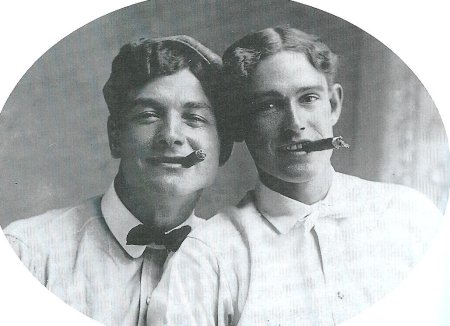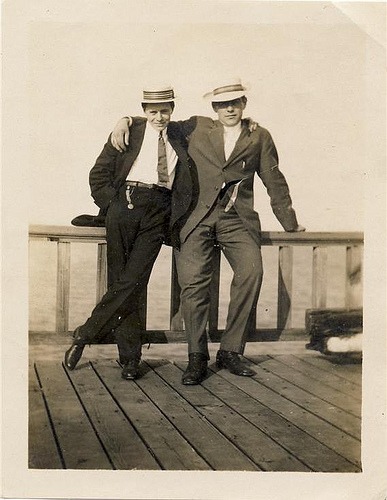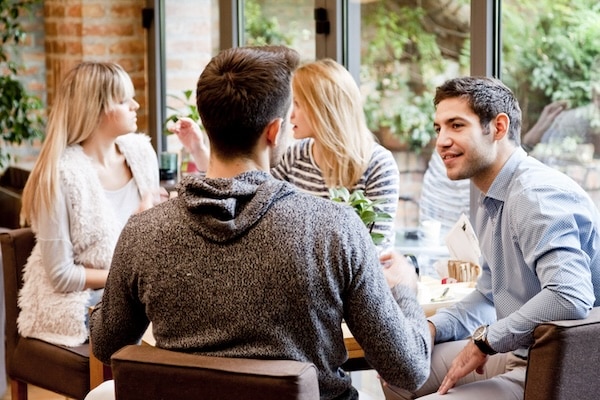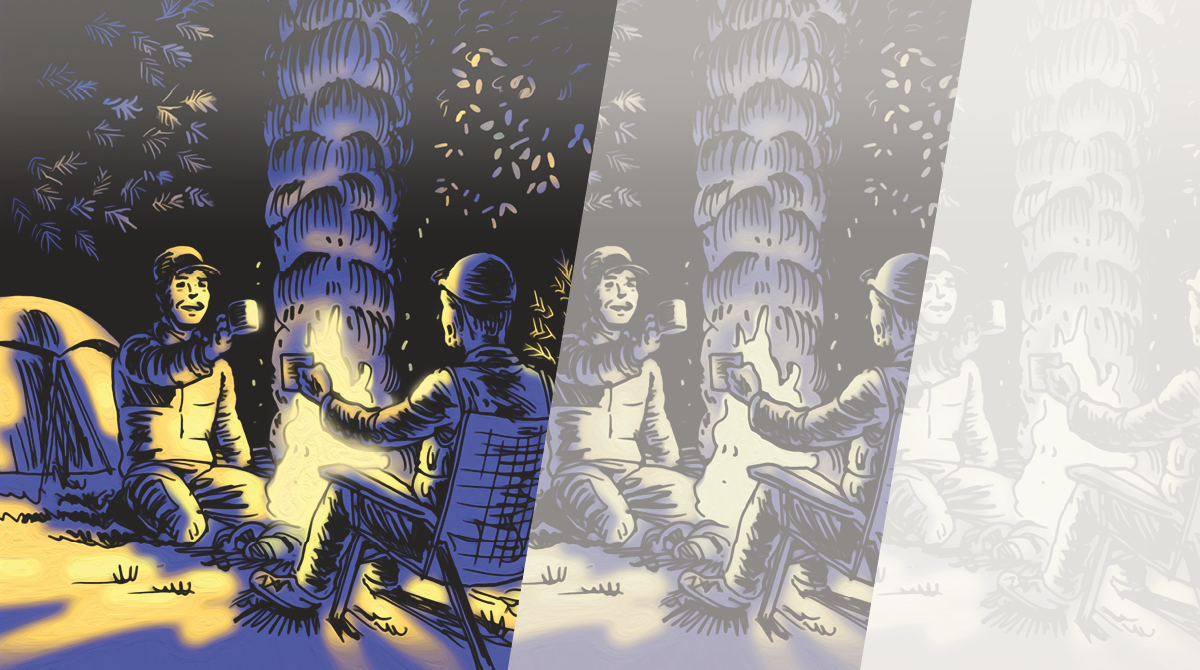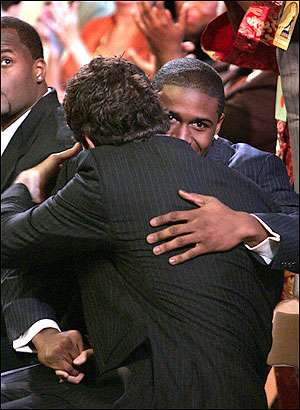
Male friendships tend to last longer than female friendships.
Male friendships generally have less tension than female friendships.
Male friends are more tolerant of their friends’ foibles and idiosyncrasies than female friends are.
Male friends are better at being fun and enjoyable companions than female friends.
Male friends experience less “friendship jealousy” and are more open to adding others to their group.
If an alien scientist came to Earth, looked at the data on male and female friendships (see the study references below), and was asked which were better, he’d reasonably conclude that men’s friendships were superior. On paper, it seems like a clear win for the guys.
Yet our society elevates female friendships as the ideal. We’re constantly told that men have a friendship problem and should strive to be more like women in this regard.
This hasn’t always been the case; in ancient Greece, for example, it was male friendships that were held up as the ideal.
To understand why women’s friendships are now elevated while men’s friendships are denigrated, we have to go back a century to ol’ Siggy Freud.
Freud and the Birth of the Hydraulic Theory of Emotions
Freud introduced a lot of ideas that have shaped our understanding of how we think about the psyche. His ideas continue to influence how we think about ourselves and our relationships with others despite the fact that many of his theories have been challenged by modern psychology.
One of Freud’s ideas that has indelibly seeped into popular culture is that of emotional repression and its potentially adverse effects on mental health. While Freud theorized that repression helped a person maintain psychological equilibrium, he also thought that lying on a couch and talking to a therapist about these repressed thoughts and feelings could help people resolve their internal conflicts, leading to better mental health.
Freud’s ideas led to the development of the “hydraulic theory of emotion,” which suggests that emotions build up inside us like pressure in a steam engine. If the emotional pressure becomes too great, the thinking goes, it will create maladaptive behaviors, anxiety, and depression. Thus, we need to “let off steam” by venting: releasing our emotions and expressing them freely.
The hydraulic theory of emotions gave us things like yelling therapy and the encounter movement of the 1960s and 1970s. In encounter sessions, participants were encouraged to be as open and transparent as possible with the other participants so that they could free themselves of emotional repression.
While encounter groups have gone out of fashion, their influence is still seen today.
The hydraulic theory of emotions — the idea that happiness is born from emotional liberation — has become a primary part of our culture and the dominant theory as to how to stay emotionally and physically healthy. As a consequence, we’ve come to place a high value on emotional disclosure and vulnerability in the West.
And this is exactly where female friendships shine.
The Female Friendship Advantage
In general, female friendships emphasize disclosure, vulnerability, and the sharing of deep secrets.
Why is that?
Well, evolutionary psychologists argue that it all goes back to what prehistoric women needed in a friend thousands of years ago.
The biggest thing women needed help with was raising their kids. This was especially true because many ancient societies were patrilocal, that is, when a woman got married, she left her home and went to live in her husband’s village. Removed from her family of origin, she needed to turn to replacement kin, i.e., friends, for support.
Women looked for friends who could be “alloparents” — individuals other than the biological parents who help care for and raise one’s children.
A woman wouldn’t want just anyone to be involved in her kids’ lives. She had to do a lot of vetting to figure out if she could trust someone to be a good surrogate mom for her children. All this vetting, based on mutual self-disclosure and secret-sharing, created deep, intimate bonds between women.
While women today aren’t typically consciously looking for alloparents in potential friends, this evolved pattern of mutual self-disclosure persists in the modern day.
Emotional Disclosure Is Not the Be-All, End-All of Happiness, or Friendships
Our culture values emotional expression as the key to health and happiness.
Female friendships are generally superior as to emotional expression.
Therefore, while male friendships have their own set of advantages, because our culture disproportionately values disclosure, it gives this quality disproportionate weight on the friendship scale, and thus elevates female friendships as the ideal kind.
But the reasonableness of weighing things this way and making that assessment depends on whether the “sharing feelings = happiness” theory is proven and universal.
And, despite how deeply ingrained it is in our particular culture, this isn’t the case.
Research does show that various forms of talk therapy can benefit individuals’ mental health, and getting things off your chest can be a big relief and a healing help.
But studies also exist that suggest that it’s possible to be perfectly content in life without talking about your feelings with other people. Research that compared different cultures has found that in some societies, less emphasis is placed on emotional disclosure, yet individuals in those cultures do not necessarily have worse mental health outcomes.
Other studies have found that talking about your emotions all the time can actually make your mental health problems worse.
For example, studies have shown that depressed or anxious individuals who talk about their negative feelings with their friends – a process called co-rumination – often actually exacerbate their depressive or anxious feelings.
Studies have also found that Stoic practices like reframing emotions and cognitive distancing can help individuals maintain a healthy emotional equilibrium without requiring one’s feelings to be divulged and vented to others.
If releasing emotions and sharing your feelings was the fundamental key to happiness, then women, who enjoy friendships that are high in vulnerability and disclosure, should be significantly happier than men. But, in fact, they are diagnosed with depression twice as often.
Once you realize that the frequent sharing of emotions and secrets is not essential to happiness, and thus that the degree to which a relationship facilitates emotional disclosure isn’t the deciding factor in what makes it “better” or “worse,” you realize that men’s friendships are not necessarily inferior to women’s.
They’re just different.
And there’s a reason for that: evolution shaped male friendship with a different set of influences.
During the earliest years of human history, men primarily formed friendships that centered on cooperative activities — like hunting and fighting. To succeed at hunting and fighting, you wanted to have as many other guys helping you out as possible. Dudes in your hunting party or war gang were replaceable. If one guy died, you could always get another guy to replace him. Ancient men weren’t that concerned with developing deep, intimate relationships with their bros. You just needed a comrade who had your back, who you could get things done with. Consequently, men formed larger networks of shallower relationships.
You still see the evolutionary legacy of this pattern today. Modern men’s social networks tend to be larger and less dyadic (one-on-one) than women’s, and their friendships, while not as emotionally intimate as women’s, have less fraught tension and more cooperative chill.
Men and women’s friendships aren’t “better” or “worse.” Each has their strengths. And indeed, males report being just as satisfied with their friendships as females are.
The problem is, no one seems to believe them.
Telling Men Their Friendships Need to Look Like Female Friendships May Be Contributing to the “Male Loneliness Crisis”
Men today find themselves in an evolutionary mismatch with their social environment. They’re not as suited for emotional self-disclosure and vulnerability compared to women, but they’re constantly told by the broader culture that if they want to be emotionally healthy and have robust relationships, they NEED to share their emotions and be vulnerable with their friends. They need to make their friendships more like female friendships.
Ironically, all this emphasis on encouraging men’s friendships to mirror the intimate, dyadic friendships of women may be deepening the oft-discussed “male loneliness crisis,” rather than mitigating it.
Because here’s the interesting thing about loneliness: it’s a subjective feeling.
One person can be alone and feel entirely content. Another can be surrounded by friends and feel very lonely.
How lonely we feel depends not only on the objective state of our social life but on how we think our social life should be. Unmet expectations that arise between the two can lead to feelings of loneliness.
Constantly being presented with the idea that their friendships should mirror the deep, intimate, dyadic friendships of women alters men’s expectations in a potentially unhelpful way.
Guys see memes about how it’s dysfunctional to spend hours with their buddies without discussing personal issues, or read a reddit post about how sad it is that men don’t have friends they can completely open up to, or listen to a podcast about how they need to be vulnerable with other men if they want to be happy and healthy, and start wondering if their social life is subpar and they’re missing out.
“Man, maybe I don’t have good friends after all. Maybe I am a lonely sad sack because I don’t have a bosom buddy to share my deepest emotions with.”
Guys get the message that a good friendship looks like a female friendship; because their friendships don’t look like female friendships, men who might otherwise have felt content with the state of their shallower-but-still-satisfying social lives feel dissatisfied — and lonelier — instead.
We think men are unhappy because they don’t have friendships that look like female friendships. But there may be other reasons men are unhappy, and getting the message that they’re failing on the friendship front simply makes them even more unhappy.
Celebrating and Embracing Male Friendship on Its Own Terms
It’s not that men can’t have deep, dyadic relationships with other men, don’t like to have a particular buddy they’re particularly close to, and don’t want to share their deepest emotions with a male friend from time to time. They can, and they do. It’s just that evolution didn’t shape men to make these kinds of intimate friendships a primary need.
Many men prefer relationships that are “shoulder to shoulder” rather than “face to face.”
Many men are content to have friendships that center around participating in activities rather than sharing feelings.
Many men are perfectly satisfied with playing golf with a buddy for hours, cracking jokes and talking about who knows what, without delving into the intimate details of what’s going on in their lives.
Many men are truly fine with not seeing their best friend for weeks or even months before getting back together to catch up.
Instead of the culture at large arguing that men can’t really be happy with the kinds of friendship dynamics they prefer, maybe we should believe the men who say that they are.
Instead of wives and girlfriends pushing their husbands and boyfriends to invest themselves as much in their friendships as they do in theirs, maybe they could recognize that their male partners don’t experience that need in the same way.
Instead of trying to force male friendships into a female mold, maybe we should just let men make the connections that feel the most natural to them.
Now, if men not only don’t have bosom-buddy type friendships but don’t have that “superficial” network of friends they can hang with from time to time either, then that is a problem. That is a recipe for poor mental health. Relationships are the primary driver of our happiness.
But developing this kind of social circle is a lot more accessible and achievable than telling men they need to go out and find other men who want to confess their deepest secrets to each other. Setting the friendship bar where most men would like to set it will lead to more relational success, not less.
Ultimately, the key to satisfying friendships isn’t about conforming to any one model but about finding connections that feel authentic and fulfilling to you.
For many men, that might mean less talk and more action—and there’s absolutely nothing wrong with that.
In fact, men should take some healthy pride in their approach to friendships. Men’s friendships have their own strengths that are worth celebrating: they’re fun, they’re chill, they’re lasting. Dude friendships may be different than lady friendships, but honestly, they still really rock.
For more on the differences between male and female friendships, listen to our conversation with Dr. Jaimie Krems, who runs UCLA’s Social Minds Lab:
Studies
- The greater fragility of females’ versus males’ closest same-sex friendships
- Males’ greater tolerance of same-sex peers
- Sex (similarities and) differences in friendship jealousy
- Sex differences in friendship preferences
- The social tasks of friendship: Do boys and girls excel in different tasks?
- Exploring the East-West divide in prevalence of affective disorder: A case for cultural differences in coping with negative emotion
- Co-rumination, anxiety, and maladaptive cognitive schemas: when friendship can hurt
- The Western origins of mindfulness therapy in ancient Rome



